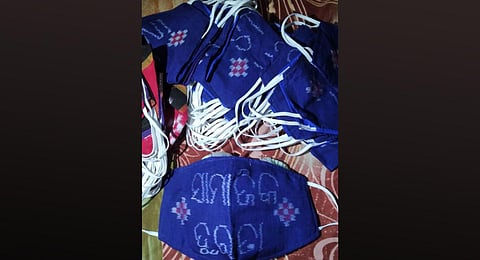

BARGARH: The soaring demand for Sambalpuri masks has come as a saving grace for local weavers whose livelihood has taken a severe beating due to the Covid-19 pandemic.
After lockdown 1.0 was imposed, the handloom trade came to a standstill in Bargarh. With no access to market, the weavers were left with huge stocks of handloom cloths.
However, with handloom masks becoming popular, the weavers heaved a sigh of relief as their unused stocks started to go off the shelves.
A weaver from Gudeisira Ranjan Meher said, “We were worried over our pending stocks. As the demand for Sambalpuri masks rose, we were approached by many master weavers and traders who were ready to purchase our fabric.”
However, the inconvenience caused by the coronavirus crisis continues to persists. Many weavers claimed that traders of threads and dyes are selling them at prices higher than the MRP citing shortage of supply. While price of a bundle of thread has increased by Rs 400 - Rs 500, the cost of dyes has been hiked by at least Rs 200 depending on the colours.
Though there is a Government thread bank in Bargarh, the weavers don’t get enough raw materials most of the times.
Ranjan said before lockdown, a weaver’s family produced fabric worth Rs 8,000 to Rs 10,000 on an average.
However, the weavers have been forced to cut down the production to Rs 5,000 - Rs 6000.
The worst hit are the small weavers.Renowned master weaver and member of the Board of Directors, Boyanakia Sanjay Meher said, “Hundreds of weavers are out of work due to the pandemic. As celebration of festivals has been prohibited, large stocks of sarees and shirtings are either lying unsold with the weavers or being sold at lower prices.”
At least 150 weavers are working under Sanjay. To help them sustain their livelihood, he has engaged all of them in weaving clothes for masks. In the last four months, Sanjay has produced over 10,000 masks.
Similarly, owner of ‘Sambalika’ Samit Kar said he was approached by a few weavers who were sitting idle during the lockdown period.
“Their main concern was the ready stock piled up with them. Since mask was the only option to utilise their clothes, I decided to help them,” he said.
Subsequently, Samit launched the ‘Masks of Hope’ campaign to popularise Sambalpuri mask among the locals of Sambalpur.
He procured handloom clothes and made a range of masks. ‘Sambalika’ aims to promote Sambalpuri art and culture through handloom, handicrafts and a range of other products.
On the other hand, there are weavers like Subash Meher who have converted the mask-making trade into a profitable venture by adapting to the new business environment post-coronavirus.
Subash of Sarkanda village under Sohela block is making handloom masks with Covid-19 awareness messages. His idea of making customised masks has become a huge hit among locals of Bargarh district.
“Sitting idle at home, I thought of experimenting handloom face masks with messages on them. I finalised a few messages in English as well as the local dialect like ‘I am Safe. Are You?’, ‘Stay Home’, ‘Ghare Raha, bhake Raha’, ‘Sarkari Task, Sabhe Pindha Mask’, ‘Samajik Durata’ and ‘Chhadia Raha’ (Keep Distance),” he said.
So far, Subash has produced at least 1,000 masks and sold them. While each mask costs him roughly Rs 35, he sells them for Rs 50 each.
Subash, however, expressed concern over the plight of weavers in the region during the Covid-19 crisis.
“I somehow managed to eke out a living with the resources I had. But the weavers here are going through a tough situation in this pandemic. While the support of local cooperative society and Bastralaya is negligible, we are also deprived of the benefits of the State Government,” he rued.